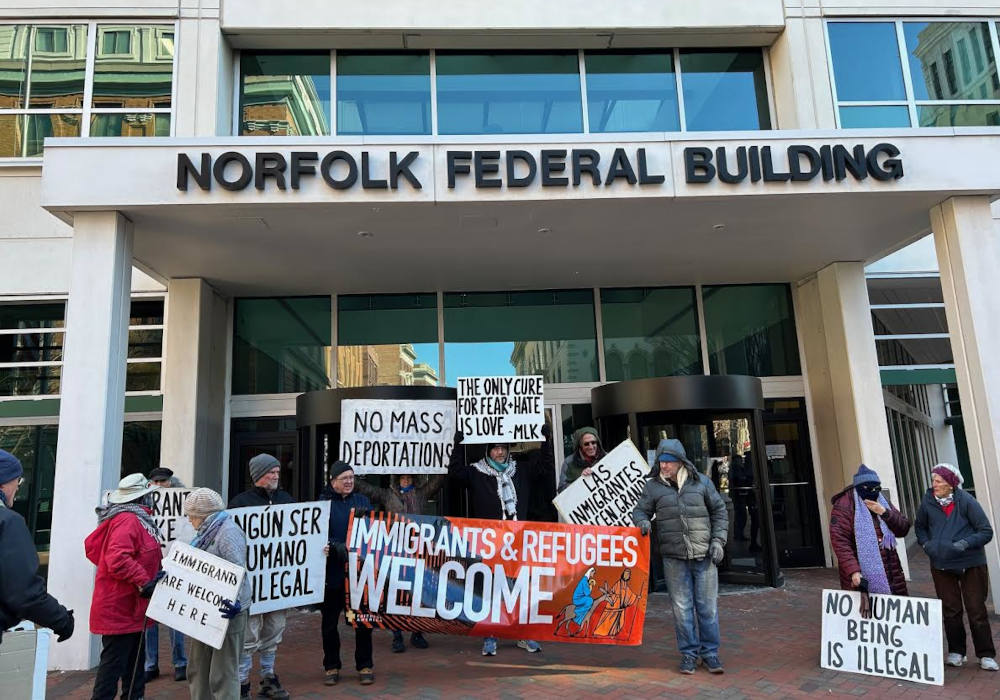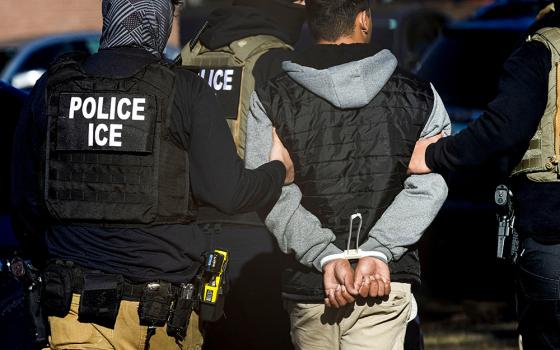Donald Trump is sworn in as the 47th president of the United States by Chief Justice John Roberts as Melania Trump holds the Bible during the inauguration ceremony in the Capitol Rotunda in Washington Jan. 20, 2025. (OSV News/Morry Gash, pool via Reuters)
Donald J. Trump, sworn in as the 47th president on Jan. 20, returned to the White House promising dramatic changes for the United States, some that immediately raised alarms among Catholic leaders who see them as contrary to the teachings of the Catholic Church.
Throughout the first day of his second administration, Trump issued a flurry of executive orders, declaring national emergencies on energy and at the U.S. southern border, moves meant to expand fossil fuel production and halt immigration at the border, while pledging to end birthright citizenship and initiating exits from the Paris climate accord and the World Health Organization.
Many of Trump’s executive orders are expected to be challenged in court and by Democrats in Congress.
"Our golden age has just begun," he said in his inaugural address.
"We stand on the verge of the four greatest years in American history. With your help, we will restore American promise, and we will rebuild the nation that we love, and we love it so much. We are one people, one family and one glorious nation under God," he said.
It was divine intervention, Trump said, that prevented an assassin's bullet from taking his life at a July campaign rally in Pennsylvania. "I felt then, and believe even more so now, that my life was saved for a reason. I was saved by God to make America great again," he said.
Trump, at 78 the oldest person elected president, began the day at a church service at St. John's Episcopal Church across from the White House. The first convicted felon to take the oath of office, he did so without placing his hand on the Bibles held by his wife, Melania.
Trump's return to the White House was greeted with mixed and cautious responses from leaders of the Catholic Church.
Ahead of the inauguration, Pope Francis delivered dual messages to Trump, urging that as president he reject "hatred, discrimination or exclusion," while denouncing Trump's plans to deport millions of migrants as a "disgrace."
The U.S. bishops' conference "will be carefully reviewing the executive orders that are expected to be signed today by President Trump," said spokeswoman Chieko Noguchi in a Jan. 20 statement. Noguchi said the church teachings call "us to uphold the sacredness of human life and the God-given dignity of the human person," including immigrants, refugees and the poor.
Cardinal Blase Cupich of Chicago said he was deeply disturbed by news reports that Trump plans a massive migrant roundup in his archdiocese as early as Tuesday. "The Catholic community stands with the people of Chicago in speaking out in defense of the rights of immigrants and asylum seekers," Cupich said.
During the ceremony inside the U.S. Capitol Rotunda, where an arctic chill had forced the ceremony, Cardinal Timothy Dolan of New York delivered one of two invocations. Dolan offered prayers for "Trump, his family, his advisers, his cabinet, his aspirations, his vice president."
Later in the day, Trump, who was twice impeached during his previous administration, signed the first executive orders of his second term in front of thousands of supporters at Capital One Arena in Washington, D.C. More were issued later from the Oval Office.
U.S. President Donald Trump signs documents in the Oval Office at the White House on Inauguration Day in Washington Jan. 20, 2025. He signed a series of executive orders including on immigration, birthright citizenship and climate. Trump also signed an executive order granting about 1,500 pardons for those charged in connection with the Jan. 6, 2021, riot at the U.S. Capitol. (OSV News/Reuters/Carlos Barria)
On immigration, he declared a national emergency at the U.S.-Mexico border, directing military units to the border and the construction of a wall. Other orders suspended refugee asylum claims; directed the apprehension and removal of any people in violation of immigration laws; ended the release of migrants who cross into the country illegally, including those seeking asylum; designated foreign gangs and cartels as terrorist organizations; and reinstated the "Remain in Mexico" policy from Trump's first administration.
In addition, Trump signed an executive order that would reinterpret the 14th Amendment of the U.S. Constitution, which grants citizenship to persons born in the U.S., to exclude children born to parents who entered the country illegally.
The U.S. Conference of Catholic Bishops opposes the repeal of birthright citizenship, saying in an issue brief that such a move "would render innocent children stateless, depriving them of the ability to thrive in their communities and reach their full potential."
In December, the number of migrants arrested illegally crossing the U.S.-Mexico border was lower than at the end of Trump’s first term. There were about 11 million unauthorized immigrants nationwide in 2022, according to a 2024 Pew Research Center study, based on 2022 census data.
About 200 miles south of D.C., more than 15 people gathered in the bitter cold near the Federal Building in downtown Norfolk, Virginia, to protest Trump’s plans to begin deporting millions of unauthorized immigrants.
"As a Catholic who believes in respecting life, I have to come here," said Kim Williams, who with her husband, Steve Baggarly, founded the Norfolk Catholic Worker, which organized the roughly hourlong demonstration.
"I have to speak out for immigrants who will face having their families torn apart and being sent to their death through a policy of mass deportation," she said.

More than 15 people gathered Jan. 20 outside of the Federal Building in downtown Norfolk, Virginia, to protest President Donald Trump's planned mass deportation of immigrants who are in the country illegally. (Bob McCabe)
Trump also issued a series of executive orders on energy, with one declaring an "energy emergency" to expand U.S. oil production. In addition, he moved to lift restrictions on drilling in Alaska, halt offshore wind farms, and roll back environmental protections and clean energy and environmental justice policies established under former President Joe Biden.
To crowd cheers at Capital One Arena, Trump signed his second withdrawal of the U.S. from the Paris Agreement on climate change, a framework that includes the Holy See as a member. Under the Paris accord, the withdrawal will go into effect within a year.
"We will be a rich nation again, and it is that liquid gold under our feet will help to do it," he said in his inaugural speech, referring to oil.
Earlier this month, Dan Misleh, founder and executive director of the D.C.-based Catholic Climate Covenant, warned of Trump’s actions on energy. "I think it's going to be a challenging time for the environmental issues that are of concern to the church and lots of young people as well," Misleh said.
In a separate executive order, Trump moved to again withdraw the U.S. from the World Health Organization. Other orders established an external revenue service and a department of government efficiency, though creating Cabinet-level departments requires an act of Congress.
Additional orders moved to end government censorship, reinstate members of the military who objected to the COVID-19 vaccine; reinstitute the death penalty at the federal level; end government programs on diversity, equity and inclusion; and make it federal policy to recognize only two genders, male and female.
Trump also said the U.S. would take back the Panama Canal, rename the Gulf of Mexico as the Gulf of America and change the name of North America's highest peak from Denali back to Mount McKinley.
"Our liberties and our nation’s glorious destiny will no longer be denied," he said in his speech inside the Capitol Rotunda.
More than four years earlier, the same location was overrun with thousands of supporters as they forcibly broke into the Capitol in an effort to stop Congress' certification of the 2020 election, urged on by Trump and fueled by his false claims that election was stolen.
Now back in the White House, Trump issued full, unconditional pardons to the roughly 1,500 Jan. 6 defendants and commuted the sentences of 14 others.
Advertisement
While Trump framed many of his actions as part of a "mandate" from voters, who narrowly gave him the popular vote, polling shows limited support for many of his initiatives. A January survey of U.S. adults by the Associated Press showed a majority of respondents in favor of deporting immigrants who had been convicted of a violent crime, only a third approved of deporting immigrants without a criminal record. Clear majorities opposed ending birthright citizenship, exiting the Paris Agreement, pardoning Jan. 6 defendants and expanding fossil fuel production.
Throughout the many executive orders Trump issued on day one, he moved to rescind dozens of actions by his predecessor Biden, the country's second Catholic president.
In one of his final acts as president, Biden commuted the life sentence for Leonard Peltier, a Native American rights activist convicted in the deaths of two FBI agents during a 1975 shootout on the Pine Ridge Indian Reservation.
Biden also issued preemptive pardons to members of the Jan. 6 committee, former head of the Joint Chiefs of Staff Gen. Mark Milley, Dr. Anthony Fauci, and five members of Biden's family.
Speaking at Joint Base Andrews after his departure from the White House, Biden said Trump's inaugural address made it clear "we've got a lot more to do." The now-former president then made the sign of the cross.
"We're leaving office, but we're not leaving the fight," he said to his assembled staff. "You're smart, you're skilled, you're passionate, and the country needs you again."
Freelance reporter Robert McCabe contributed to this report from Norfolk, Virginia.





